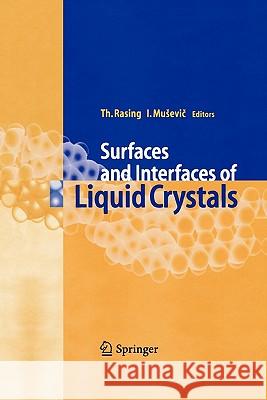Surfaces and Interfaces of Liquid Crystals » książka
Surfaces and Interfaces of Liquid Crystals
ISBN-13: 9783642058684 / Angielski / Miękka / 2010 / 298 str.
Igor Musevic, Cindy Nieuwkerk and Theo Rasing Since the pioneering work on surface-induced alignment of liquid crystals, performed by Lehmann 1], Grandjean 2], Mauguin 3], Chatelain 4], and others 5], scientist have been looking for the answer to the question: why do certain surfaces align liquid crystals and others not'? The answer to this question has become even more important with the advent of modern liquid crystal display technologies, that are based on re liable and technologically controllable surface alignment of liquid crystals, used in a variety of electrooptic devices, such as liquid crystal displays, light modulators, optical shutters, switches, holographic systems, etc. During the last decade, the progress in the technology of liquid crystal devices, as well as the discovery of a variety of novel liquid crystalline phases have triggered a considerable and intense scientific interest in the microscopic origin of surface alignment. Fortunately, this renewed scientific and techno logical interest was accompanied by the advent of modern, surface sensitive experimental techniques, that have been successfully used in the study of liquid crystal interfaces. Whereas a decade ago the mechanisms of surface alignment were "poorly understood," nowadays we can claim that we do un derstand most of the "mysteries" of the surface alignment of liquid crystals."











